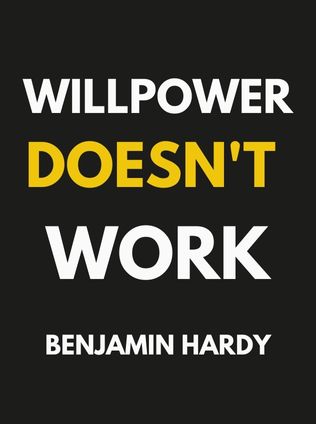
Willpower Doesn't Work
Discover the Hidden Keys to Success
By Benjamin Hardy
Published 03/2018
About the Author
Benjamin Hardy, PhD, is a renowned psychologist, best-selling author, and productivity coach who has dedicated his career to understanding human behavior and motivation. He holds a PhD in Organizational Psychology from Clemson University, a background that deeply informs his work. Hardy is perhaps best known for his groundbreaking book Willpower Doesn’t Work, where he challenges the traditional reliance on willpower as a means to achieve personal and professional success. He has also co-authored influential works like The Gap and the Gain and Who Not How with entrepreneurial coach Dan Sullivan, further cementing his status as a thought leader in the field of self-improvement. Hardy is a prolific writer, regularly contributing to Medium, where he shares insights on how to take control of one's life and achieve one’s dreams. His approach is deeply rooted in practical psychology, offering actionable strategies to help individuals create environments that foster success and well-being.
Main Idea
The core thesis of Willpower Doesn’t Work is that the conventional wisdom of relying on willpower to achieve success is fundamentally flawed. Hardy argues that willpower, often likened to a muscle, is easily depleted and unreliable, especially in the modern world where we are constantly bombarded with decisions, temptations, and distractions. Instead of attempting to “will” ourselves to success, Hardy advocates for a more effective approach: designing environments that naturally lead to desired outcomes. By intentionally shaping our surroundings, we can reduce our reliance on willpower and make success almost inevitable. Hardy’s ideas challenge the deep-seated belief that discipline and determination are the keys to achievement, proposing instead that the key lies in environmental design. This book offers a roadmap for optimizing our physical, mental, and social environments to align with our goals, making the path to success easier and more sustainable.
Table of Contents
- The Problem: Willpower Is Weaker Than You Think
- The Solution: Design Environments That Force You to Succeed
- Create a Work Environment and a Rest Environment
- Force Yourself Toward Your Work Goals
- Force Yourself Toward Your Rest Goals
- Tip #1: Force Yourself Toward Your Goals
- Tip #2: Remove Temptations
- Tip #3: Optimize Your Mental Environment
The Problem: Willpower Is Weaker Than You Think
Hardy begins his exploration by challenging the widely held belief that willpower is the primary driver of success. He argues that this belief is not only misguided but also counterproductive. Willpower, according to Hardy, is a finite resource that can be easily exhausted, particularly in the context of modern life, where we face a constant barrage of decisions and temptations. Hardy uses the metaphor of a muscle to describe willpower: like a muscle, willpower can be strengthened, but it also tires with use and has limited capacity. He notes,
"No matter how hard you work, there’s only so much your willpower can do. Modern life ensures that your willpower is permanently exhausted." (Hardy)
This insight is critical because it shifts the focus from trying to bolster willpower to recognizing its limitations and seeking alternative strategies for success. Hardy's critique is supported by psychological research, including studies on decision fatigue, which show that the more decisions we make throughout the day, the worse we become at making them. This depletion of willpower leads to poor choices and ultimately hinders our ability to achieve our goals.
The Fallacy of Willpower-Based Success
The traditional narrative around success often emphasizes the importance of willpower and discipline. We are taught that with enough determination, we can achieve anything we set our minds to. However, Hardy argues that this narrative is not only flawed but also harmful. By placing the burden of success on willpower, we set ourselves up for failure. When our willpower inevitably falters, we blame ourselves for lacking discipline, rather than recognizing the systemic issues that contribute to our struggles.
Hardy contends that willpower is not a reliable foundation for success because it is inherently fragile. The constant demands of modern life—work pressures, social obligations, and the omnipresence of digital distractions—create an environment where willpower is continuously tested and often found wanting. This realization leads Hardy to propose a radically different approach: instead of relying on willpower, we should focus on designing environments that naturally lead to success.
The Solution: Design Environments That Force You to Succeed
If willpower is weak and unreliable, how can we achieve our goals? Hardy’s answer is simple but profound: we must design our environments in a way that makes success inevitable. He argues that humans are highly adaptable to their surroundings, and by carefully crafting our environments, we can create conditions that align with our goals and minimize the need for willpower.
Sign up for FREE and get access to 1,400+ books summaries.
You May Also Like
The Subtle Art of Not Giving a F*ck
A Counterintuitive Approach to Living a Good Life
By Mark MansonRich Dad Poor Dad
What the Rich Teach Their Kids About Money - That the Poor and Middle Class Do Not!
By Robert T. KiyosakiHow To Win Friends and Influence People
The All-Time Classic Manual Of People Skills
By Dale CarnegieFreakonomics
A Rogue Economist Explores the Hidden Side of Everything
By Steven D. Levitt and Stephen J. Dubner



















